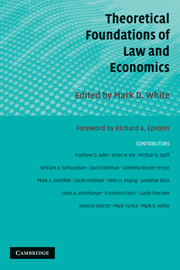Book contents
- Frontmatter
- Contents
- Foreword
- Preface
- Notes on Contributors
- PART ONE THE ROLE AND USE OF ECONOMICS IN LEGAL STUDIES
- PART TWO EFFICIENCY
- PART THREE RATIONALITY AND THE LAW
- PART FOUR VALUES AND ETHICS IN CIVIL AND CRIMINAL LAW
- 11 Law and Economics and Explanation in Contract Law
- 12 Welfare, Autonomy, and Contractual Freedom
- 13 Efficiency, Fairness, and the Economic Analysis of Tort Law
- 14 Retributivism in a World of Scarcity
- Index
- References
14 - Retributivism in a World of Scarcity
Published online by Cambridge University Press: 06 July 2009
- Frontmatter
- Contents
- Foreword
- Preface
- Notes on Contributors
- PART ONE THE ROLE AND USE OF ECONOMICS IN LEGAL STUDIES
- PART TWO EFFICIENCY
- PART THREE RATIONALITY AND THE LAW
- PART FOUR VALUES AND ETHICS IN CIVIL AND CRIMINAL LAW
- 11 Law and Economics and Explanation in Contract Law
- 12 Welfare, Autonomy, and Contractual Freedom
- 13 Efficiency, Fairness, and the Economic Analysis of Tort Law
- 14 Retributivism in a World of Scarcity
- Index
- References
Summary
In the philosophy of law, the two primary justifications and/or motivations for criminal punishment are deterrence and retributivism. Deterrence is a consequentialist concept, linking punishment to a reduction in the future crime rate through its effects on criminal behavior. Stated this way, it is easy to see why economists who study the criminal law adopt deterrence as its goal: mainstream economics is essentially consequentialist itself, emphasizing the efficiency of outcomes above all other considerations, and it also has an elaborate (though imperfect) theory of rational choice and behavior. Provided that criminal penalties are interpreted as material disincentives similar to market prices, that the harm from criminal activity can be quantified, and that current models of rational decision making are sufficiently precise and accurate – all controversial claims outside the economic approach to law – economists can, in theory, design penalties optimally to minimize the sum of harm from crime and the costs of punishment itself.
On the other hand, retributivism would seem to stand in opposition to these specialized tools of the economist. Though scholars interpret the basic concept differently, at its core retributivism has a deontological component that justifies the punishment of wrongdoers as a matter of justice or right, based on desert and guilt. Retributivism is usually divided into two varieties: negative, or weak, retributivism sees wrongdoing as a necessary but not sufficient condition for punishment, whereas positive, or strong, retributivism holds wrongdoing to be both necessary and sufficient for punishment.
- Type
- Chapter
- Information
- Theoretical Foundations of Law and Economics , pp. 253 - 272Publisher: Cambridge University PressPrint publication year: 2008
References
- 2
- Cited by



